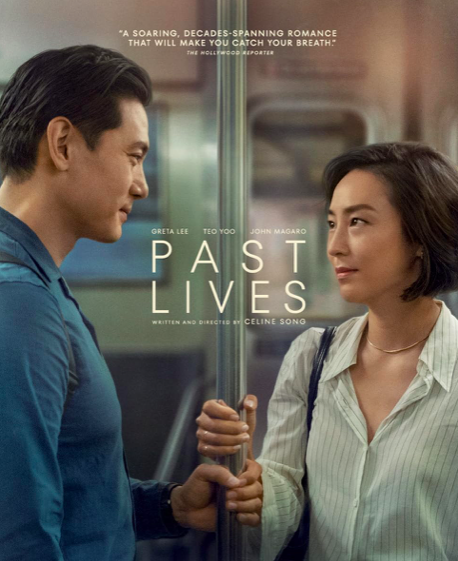Celine Song’s sparkling directorial debut in “Past Lives” embraces the in-between. The romantic drama focuses on the intricacies of human connection and sensitively explores the everyday outcomes of ‘what if’ questions. Exploring loss in its most authentic form, the A24 film is an ode to saying goodbye to loved ones and the spaces they occupy.
Na Young (Greta Lee) and Hae Sung (Teo Yoo) are childhood friends from South Korea. A playful sense of competition ignites their connection and endearment for each other. Pending Na Young’s move to Canada, the audience witnesses nostalgic snippets of classroom banter and courtyard ball games from their final days together.
The film shines where it is not predictable, trailing the characters’ lived and forfeited choices, and how they coalesce in the present. In vignettes that detail their 24 years apart, the characters’ culture and identity transform. These complex notions run parallel with the characters’ individual trajectories, forming a romance of in-betweens that evades concrete definition.
This symbolism is found throughout Song’s screenplay, tightly wound with the Korean concept of in-yun. Often translated to “fate” or “providence,” the term links the interactions between two people to the byproduct of their past and near-encounters. In-yun is cumulative, just as the essence of the film is found in the cumulation of narratives big and small.
Twelve years after leaving Korea, Na Young is now Nora, an aspiring playwright living in New York. This tonal shift is represented through aerial footage of the city, embodying her growing ambitions.
Nora and Hae Sung initiate their first reunion, albeit virtually. The coarse, throbbing strings in “Do You Remember Me,” the fourth track of the original score, introduces their cautious but tender reunion.The film’s dialogue purposefully coaxes silence and stillness. Everything is seen from afar, creating a unique intimacy that occurs through perpetual yearning.
What follows is magic. Camera angles limit the audience’s perspective as the characters are seen through the same fuzzy computer screens they both peer into. One call turns into two, three and four as they reassert themselves in each other’s daily lives. The resounding triumph of the film occurs as these routines stutter and grind to a halt.
Co-stars Lee and Yoo thrive in this emptiness, using their body language as an immersive storytelling agent; subtleties in facial expressions trace decades of distance, creating a pause at the crux of the film. It’s another 12 years until Hae Sung visits Nora in person, now married to fellow writer Arthur (John Magaro). This time, there is no room to bask in the past.
While the differences in their lives are clearer than ever, Song excels in establishing continuity. The characters – an immigrant and a tourist – reunite in Central Park. Nora breaks their tension with a hug, inviting a relieved, yet hesitant Hae Sung into her physical space.
Viewers recall a familiar image; young Hae Sung walks home with Nora and an unspoken affinity for her confidence is replicated 24 years later in the backdrop of the Statue of Liberty.
The sights and sounds of New York City situate Nora and Hae Sung in another fascinating limbo. Christopher Bear and Daniel Rossen crafted a lush, yet stripped soundtrack to soften the city’s bustle. At points where time seems suspended between Nora and Hae Sung, the music punctuates silences and wistful glances, serving as a reminder their reunion is a present reality and not a modulated version of the past.
In the same way that Nora and Hae Sung’s stories are intrinsically connected, their divergence shapes the most crucial takeaway of the film. When Nora struggles to contextualize what role Hae Sung plays in her life now, Arthur is the mediator who nudges all three to bear the weight of their past and present selves.
Hae Sung’s yearning for an antiquated version of their relationship eclipses what is right in front of him; a love so intense, it can only be platonic.
The film transcends the bounds of a classic love triangle. The characters are most vulnerable when welcoming a connection back into their lives, and most human when confronting the inherently different circumstances. “Past Lives” is a patient and searingly universal story, serving as an examination of what it means to reflect and reminisce on the consequences.
Catharine Li can be reached at [email protected].




















